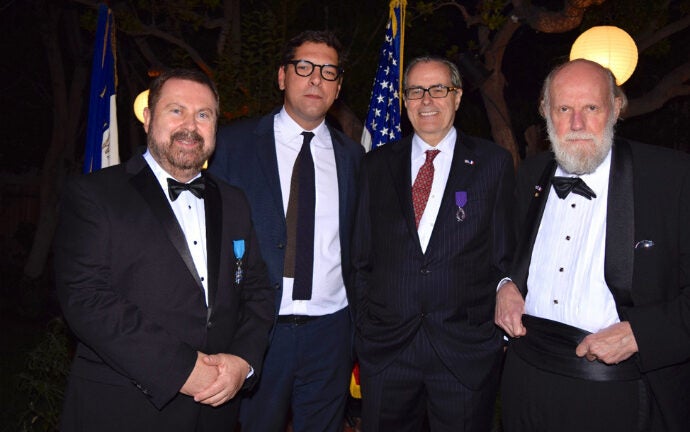
Workshop explores oxygen paradox and French paradox in aging and disease
French and American experts discussed the roles of free radicals and oxidative stress in heart disease, cancer, Alzheimer’s disease and other aging-related conditions during a recent “ParadOx Workshop.” Held at the Moseley-Salvatori Conference Center of the Good Samaritan Hospital of Los Angeles, the workshop explored the “oxygen paradox,” the “French paradox,” and the roles free radicals and oxidative stress play in diseases of aging as well as the aging process itself.
“The oxygen paradox is simply the fact that, although oxygen is required for human life, it is also extremely harmful because of the free radicals and other oxidants generated by metabolism, radiation and environmental toxicants: A problem often referred to as oxidative stress,” said workshop co-organizer Kelvin Davies, James E. Birren Chair in Gerontology and professor of biological sciences.
Davies, who is also dean of faculty of USC Leonard Davis School of Gerontology, noted that the so-called French paradox points at an apparent anomaly associated with the typical French diet: Despite being relatively high in lipids and cholesterol, the diet does not seem to increase the incidence of heart attacks and strokes over that seen in the United States.
“Of course, oxidative stress, poor diets, obesity and physical inactivity all have long been associated with increased risk of heart diseases, stroke, Alzheimer’s disease and other dementias, and cancer,” Davies said. He also noted that oxidative stress has been considered a potential factor in aging.
Charles McKenna, professor of chemistry at USC Dornsife, noted that the French diet appears not to speed aging in general.
“The French paradox is an interesting hypothesis about health wherein the richness of French cuisine, including quotidian delectation of French vintages, appears to intersect with surprising but gratifying longevity,” he said.
More than 30 clinical and laboratory scientists from the U.S. — most from USC and Good Samaritan Hospital — joined 30 French researchers to discuss both new therapeutic approaches and new research findings in the area and to assess both the convergent and divergent trends in disease etiology, disease progression and prognosis between the two countries.
McKenna, who holds a bachelor’s degree in French literature and who also was decorated by France as a Chevalier in the Ordre des Palmes Académiques, was among the honored guests at a gala reception and dinner for the ParadOx Workshop, hosted by Christophe Lemoine, Consul Général of France in L.A., at the Résidence de France in Beverly Hills.
“It was truly a pleasure to participate in the scientific debate, then apply a more gastronomical inquiry thanks to the auspices of the French Consulate in Los Angeles, co-supported by our friends and colleagues in gerontology,” McKenna said.
Co-organizers of the ParadOx Workshop included Joanna Davies of Good Samaritan Hospital; Enrique Cadenas, Charles Krown/Alumni Professor in Pharmaceutical Sciences at USC School of Pharmacy; Bertrand Friguet of the University Pierre & Marie Curie and the Sorbonne, Universities of Paris; and Josiane Cillard of the University of Rennes, France.
Organizers of the Workshop, which took place Oct. 13–16, noted their gratitude for the assistance and cooperation provided by Lemoine and his scientific attachés, Fabien Agenes and Jean Rosenbaum; USC President C. L. Max Nikias and Provost Michael Quick; and Good Samaritan Hospital President and CEO Andrew Leeka.